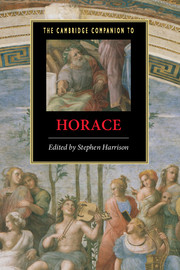Book contents
- Frontmatter
- Introduction
- Part 1: Orientations
- 1 Horace: life and chronology
- 2 Horatian self-representations
- 3 Horace and archaic Greek poetry
- 4 Horace and Hellenistic poetry
- 5 Horace and Roman literary history
- 6 Horace and Augustus
- Part 2: Poetic Genres
- Part 3: Poetic Themes
- Part 4: Receptions
- Dateline of works and major political events
- Works cited
- Index
5 - Horace and Roman literary history
from Part 1: - Orientations
Published online by Cambridge University Press: 28 May 2007
- Frontmatter
- Introduction
- Part 1: Orientations
- 1 Horace: life and chronology
- 2 Horatian self-representations
- 3 Horace and archaic Greek poetry
- 4 Horace and Hellenistic poetry
- 5 Horace and Roman literary history
- 6 Horace and Augustus
- Part 2: Poetic Genres
- Part 3: Poetic Themes
- Part 4: Receptions
- Dateline of works and major political events
- Works cited
- Index
Summary
Just as Horace appears the most forthcoming of Latin poets on the level of autobiography (see chapters 1 and 2 above), so too his statements of literary preference and affiliation are numerous and, on the surface, unambiguous. Those statements construct a picture that highlights his originality and shows scant regard for his Roman predecessors. He cites the description of Ennius as a 'second Homer' only to mock it, while the comic Plautus is blamed for negligent writing and lack of concern for anything except commercial success; even the satirist Lucilius, the only Roman poet whom Horace acknowledges as a model, receives harsh criticism for his excessive speed of production and consequent lack of polish. Of the leading figures of the generation prior to Horace, Lucretius is never mentioned and the name of Catullus appears only in a jibe at his feeble imitators. Horace’s favourable judgements seem limited to a small circle of contemporaries on one hand - Varius, Pollio and above all Virgil - and on the other to the Greek masters whom he took pride in emulating, especially Archilochus, Alcaeus and Sappho.
The foregoing sketch is not a complete travesty, but it offers no hint of the extent to which Horace’s poetry is indebted to earlier Roman authors. In seeking to understand that set of relationships Horace’s explicit statements will not take us very far: like other Latin poets, Horace signalled his literary allegiances more often through allusion than through overt reference. When critics noted that the main theme of the last movement of Brahms’s First Symphony bore a strong resemblance to the 'Ode to Joy' theme in Beethoven’s Ninth, Brahms snapped in reply, 'Any jackass can see that!' In the same way, Horace expected alert readers to recognise echoes of earlier Latin poets without explicit signposting.
- Type
- Chapter
- Information
- The Cambridge Companion to Horace , pp. 63 - 76Publisher: Cambridge University PressPrint publication year: 2007
- 6
- Cited by

